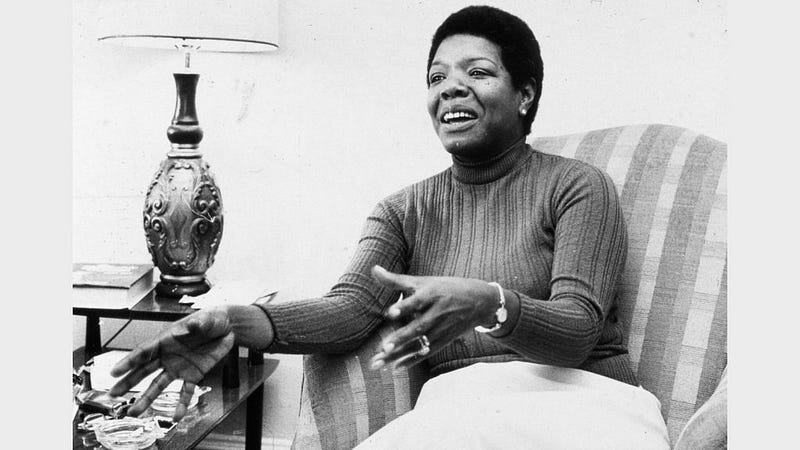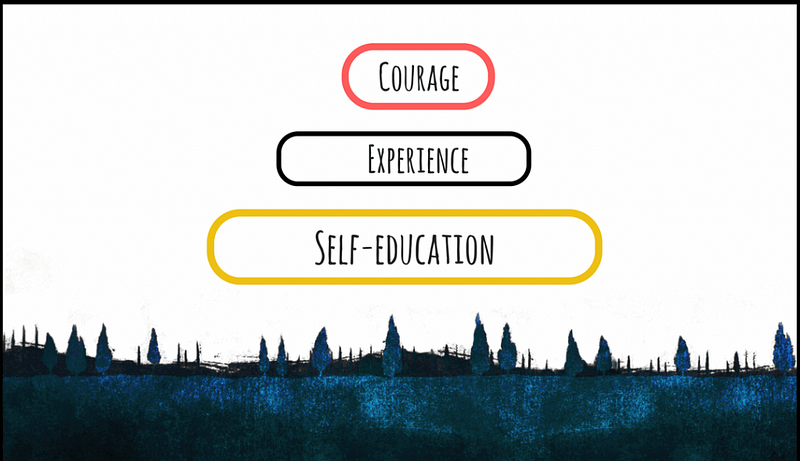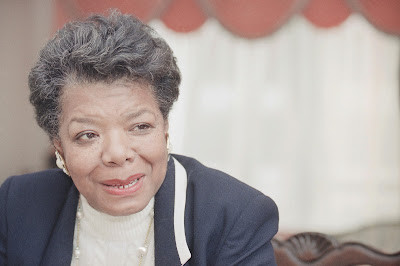Before Maya Angelou was an author, she made a living as a dancer and a performer.
Her career began in San Francisco clubs and later took her around Europe. In the process, she released albums, performed in films, and learned multiple languages. Yet, it was writing that truly excited her, and in 1959, she moved to New York City and started publishing.
Over the next decade, the relationships she built took her to Africa where she worked as an editor and a journalist and back again to the US where she fought for civil rights.
She worked with both Malcolm X and Dr. Martin Luther King. When the former was first murdered, she was devastated. When the latter, too, she fell into a deep depression.
In 1968, months after Dr. King’s assassination, she was challenged by an editor at a party to write a new, intimate kind of autobiography. One that would also function as a piece of literature. The result was I Know Why the Caged Birds Sing. It brought her immediate fame.
It also, however, shed insight into her early childhood and the struggles she persisted through. It details her experience with racial discrimination, poverty, loss, and even rape.
When asked in older age what she had learned about life, she answered that courage is the most important of the virtues because it’s the one that gets you through to everything else.
Courage is how you persist in the face of fear. It’s what inspires in days of difficulty. Over the many years, Angelou made herself a case study. She showed how it could be sourced in three different venues.

Maya Angelou
1. In the Depths of Literature
There is a certain magic that is unique to human beings. In a way, we have the option of living beyond the constraints imposed by time. We can experience more than one lifetime.
It isn’t an exaggeration to say that reading is a form of telepathy. We get to walk into the thoughts of somebody else, we get to feel what they have felt and see what they have seen, and if we get sucked in deep enough, we even get to experience their reality as our own.
While this kind of experience can’t change us in the same way that direct experience may, by embedding different perspectives in our mind, it can shape how we interact with the world.
When Maya Angelou was eight years old, she was raped by her mother’s boyfriend. She told her brother, who then told the rest of the family, and a few days later, the man responsible was found dead. Traumatized, Angelou didn’t speak a word for the next five years.
She credits overcoming the muteness to a woman she met when she moved in with her grandmother. Specifically, to the fact that she introduced her to a library. She read the work of everyone from Charles Dickens and Shakespeare to Anne Spencer and Countee Cullen.
Through the different lives and stories, she was exposed to a breadth of human ideas and experiences that she had no way of experiencing herself. She saw a world of broader possibility and lives of greater optimism. It ultimately gave her the courage to talk again.
Literature is more than just fiction, and it extends further than just storytelling. If used correctly, it can be a lens through which you can clearly make better sense of your own life.
Courage doesn’t always come from your surroundings. It can also be nurtured in your mind.
2. In the Process of Self-Education
In many ways, Angelou’s discovery of books and libraries is what turned her into who she became. Like many black US writers of the 20th century, she was largely self-educated.
What started with a deep dive into the work of some of history’s greatest icons turned into a lifelong process of learning and improvement which she used to drive herself forward.
Much of this is evident in how her career progressed. Although mainly remembered as a writer, Angelou is perhaps best described as a polymath. She could also sing, dance, and act. There is a long list of plays, movies, and shows credited to her spanning over 50 years.
Even outside of her career, she took the time to learn and educate herself, as evidenced by her language acquisition when traveling as a performer. Over the years, beyond just English, she could fluently communicate in French, Spanish, Hebrew, Italian, and Fanti.

The effect of all of this was acknowledged by her as confidence and was apparent in how she carried herself forward. Due to her experience, she had a reason to be courageous.
Education and growth come from a sense of mastery and improvement, and this kind of progress provides a strong internal foundation for us to stand on in times of challenge.
People often associate courage with a healthy belief in oneself. That said, they tend to confuse this belief with blind faith. More often than not, courage is not the cause, but the actual effect. It grows over time from a sense of accomplishment and overcoming.
In rare instances, it may manifest as a fight or flight response, but more often than not, it’s something you learn to experience as a result of your past memories and life evidence.
Self-education is the foundation of courage. The more you learn, the more you have of it.
3. In the Reminder of Gratitude
A lot of the time, we tend to confine the idea of courage to particular stereotypes. We think of a soldier in a time of war as showing courage. We think of a firefighter during a call to action as showing courage. We think of a highlighted dissenter of corruption as showing courage.
While all of these acts are indeed different forms of courage, the core definition of the word is nothing more than doing what you ought to do in the face of challenge and difficulty.
Getting out of bed on a particularly bad day can be an act of courage. Asking someone for help can be an act of courage. Not quitting in the face of setback can be an act of courage.
More than anything, courage is an act of defiance and persistence under pressure, and one of the most effective ways to harness it is to remind yourself that, overall, things are okay.
Most of us have it pretty good. Even in the face of the many challenges that we experience, if we take a step back, in the context of the broader reality, things aren’t that scary that often.
The presentation you have at work, or reaching out to a stranger for a favor, may seem like earth-shattering demands, but if you take a step back, it’s just something you have to do.
Naturally, this doesn’t apply to every difficult situation, but 90% of the day to day things that demand courage just require a simple reminder. As Maya Angelou beautifully said herself:
“The ship of my life may or may not be sailing on calm and amiable seas. The challenging days of my existence may or may not be bright and promising. Stormy or sunny days, glorious or lonely nights, I maintain an attitude of gratitude. If I insist on being pessimistic, there is always tomorrow. Today I am blessed.”
All You Need to Know
Almost everything important in life begins with proactive action. Quite often, in order to take such an action, however, it takes more than will. It requires an internal source of courage.
Maya Angelou saw it as perhaps the most important virtue, and she showed its power in her own story and in the face of the struggles and brutalities that she persisted through.
It’s not an exaggeration to say that a lack of courage is often what stops people from living a life they are capable of, rather than one that has been enforced on them by circumstance.
When the costs are this high, it’s worth nurturing a healthy source. Courage is everything.
The internet is noisy
I write at Design Luck. It’s a free high-quality newsletter with unique insights that will help you live a good life. It’s well-researched and easy-going.
1. In the Depths of Literature
There is a certain magic that is unique to human beings. In a way, we have the option of living beyond the constraints imposed by time. We can experience more than one lifetime.
It isn’t an exaggeration to say that reading is a form of telepathy. We get to walk into the thoughts of somebody else, we get to feel what they have felt and see what they have seen, and if we get sucked in deep enough, we even get to experience their reality as our own.
While this kind of experience can’t change us in the same way that direct experience may, by embedding different perspectives in our mind, it can shape how we interact with the world.
When Maya Angelou was eight years old, she was raped by her mother’s boyfriend. She told her brother, who then told the rest of the family, and a few days later, the man responsible was found dead. Traumatized, Angelou didn’t speak a word for the next five years.
She credits overcoming the muteness to a woman she met when she moved in with her grandmother. Specifically, to the fact that she introduced her to a library. She read the work of everyone from Charles Dickens and Shakespeare to Anne Spencer and Countee Cullen.
Through the different lives and stories, she was exposed to a breadth of human ideas and experiences that she had no way of experiencing herself. She saw a world of broader possibility and lives of greater optimism. It ultimately gave her the courage to talk again.
Literature is more than just fiction, and it extends further than just storytelling. If used correctly, it can be a lens through which you can clearly make better sense of your own life.
Courage doesn’t always come from your surroundings. It can also be nurtured in your mind.
2. In the Process of Self-Education
In many ways, Angelou’s discovery of books and libraries is what turned her into who she became. Like many black US writers of the 20th century, she was largely self-educated.
What started with a deep dive into the work of some of history’s greatest icons turned into a lifelong process of learning and improvement which she used to drive herself forward.
Much of this is evident in how her career progressed. Although mainly remembered as a writer, Angelou is perhaps best described as a polymath. She could also sing, dance, and act. There is a long list of plays, movies, and shows credited to her spanning over 50 years.
Even outside of her career, she took the time to learn and educate herself, as evidenced by her language acquisition when traveling as a performer. Over the years, beyond just English, she could fluently communicate in French, Spanish, Hebrew, Italian, and Fanti.

The effect of all of this was acknowledged by her as confidence and was apparent in how she carried herself forward. Due to her experience, she had a reason to be courageous.
Education and growth come from a sense of mastery and improvement, and this kind of progress provides a strong internal foundation for us to stand on in times of challenge.
People often associate courage with a healthy belief in oneself. That said, they tend to confuse this belief with blind faith. More often than not, courage is not the cause, but the actual effect. It grows over time from a sense of accomplishment and overcoming.
In rare instances, it may manifest as a fight or flight response, but more often than not, it’s something you learn to experience as a result of your past memories and life evidence.
Self-education is the foundation of courage. The more you learn, the more you have of it.
3. In the Reminder of Gratitude
A lot of the time, we tend to confine the idea of courage to particular stereotypes. We think of a soldier in a time of war as showing courage. We think of a firefighter during a call to action as showing courage. We think of a highlighted dissenter of corruption as showing courage.
While all of these acts are indeed different forms of courage, the core definition of the word is nothing more than doing what you ought to do in the face of challenge and difficulty.
Getting out of bed on a particularly bad day can be an act of courage. Asking someone for help can be an act of courage. Not quitting in the face of setback can be an act of courage.
More than anything, courage is an act of defiance and persistence under pressure, and one of the most effective ways to harness it is to remind yourself that, overall, things are okay.
Most of us have it pretty good. Even in the face of the many challenges that we experience, if we take a step back, in the context of the broader reality, things aren’t that scary that often.
The presentation you have at work, or reaching out to a stranger for a favor, may seem like earth-shattering demands, but if you take a step back, it’s just something you have to do.
Naturally, this doesn’t apply to every difficult situation, but 90% of the day to day things that demand courage just require a simple reminder. As Maya Angelou beautifully said herself:
“The ship of my life may or may not be sailing on calm and amiable seas. The challenging days of my existence may or may not be bright and promising. Stormy or sunny days, glorious or lonely nights, I maintain an attitude of gratitude. If I insist on being pessimistic, there is always tomorrow. Today I am blessed.”
All You Need to Know
Almost everything important in life begins with proactive action. Quite often, in order to take such an action, however, it takes more than will. It requires an internal source of courage.
Maya Angelou saw it as perhaps the most important virtue, and she showed its power in her own story and in the face of the struggles and brutalities that she persisted through.
It’s not an exaggeration to say that a lack of courage is often what stops people from living a life they are capable of, rather than one that has been enforced on them by circumstance.
When the costs are this high, it’s worth nurturing a healthy source. Courage is everything.
The internet is noisy
I write at Design Luck. It’s a free high-quality newsletter with unique insights that will help you live a good life. It’s well-researched and easy-going.

No comments:
Post a Comment